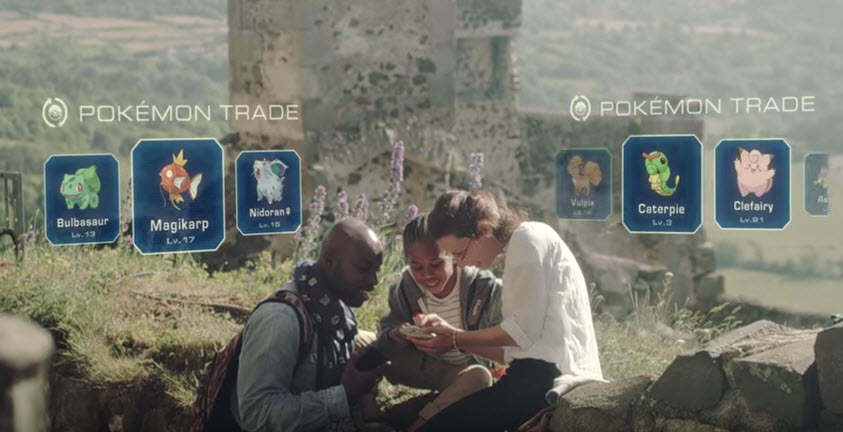 The staged roll-out of Pokemon Go has left people in countries where it is not yet available feeling left out of a global phenomenon. And it is demonstrating that to some young people, borders no longer matter.
The staged roll-out of Pokemon Go has left people in countries where it is not yet available feeling left out of a global phenomenon. And it is demonstrating that to some young people, borders no longer matter.
Those are just two of things we discovered with a quick global study we launched to gather impressions about how Pokemon Go became a global sensation within days of its launch in July 2016. Within 48 hours we had feedback from more than 60 people.
The study was conducted using an online community platform that allows participants full anonymity. Two communities were used, which had been running for three days at the time of writing.
One was a German-language community (16 participants at the time of writing), the other an English-language community (47 participants). Participants could enroll themselves using links shared on social media and were not screened in any way. Some chose to share basic demographic information, such as country and age, others did not.
While nostalgia for a loved childhood game is a significant factor in the rapid adoption, the game’s popularity snowballed, drawing in new users.
Pokemon Go makes daily life into a game, enabling new real-world interactions, combined with a sense of exploration and adventure. The blurring of boundaries between the digital and physical world is something we expect to continue to see.
Situation
There has been a huge interest in Pokemon Go since it was introduced to the market. While many countries are still waiting for the official launch, people in offices in Germany (including the Munich police station) have started to play the game. Restaurants and shops are complaining about crowds whose only purpose is to use the facilities to catch the eggs that are a key part of the game.
Australia was among the first markets to launch, while other countries such as Canada and South Africa were still waiting at the time for the official license.
Findings
People in all parts of the world are amazed by the media interest around this new app and many want to be a part of it. “I cannot recall any other app getting similar attention in the past years,” one participant said.
“When I first heard the news about the concept of an augmented reality Pokemon game I literally freaked out.” (Germany, Age 24)
“It’s the first augmented reality (AR) game to speak to the masses (i.e. through a strong consumer brand).” (Austria, Age 28)
“It is the first augmented reality game that is easy to access through smartphones.” (France, Age 35)
Interest has been so high that the launch delay in some markets makes people feel left out.
“Well, I think the fact that everyone wants to play it, but it isn’t available officially in most countries shows how younger people (don’t) really see borders as boundaries as we did a few years ago.” (South Africa, 28)
Overall, the level of excitement and curiosity was very similar, no matter what corner of the world.
Virtual + outdoors + interactive = innovative
It is clear that the game’s innovativeness is a major draw.
Pokemon Go is something completely new on the market and offers a very innovative way of gaming: While played virtually, the player has to move around outside. This requirement, along with the interactivity makes the game exciting and people want to be part of it.
“Gets people out of the house instead of sitting around in the house playing video games. Pokemon Go got more people active than Michelle Obama could.” (USA, 23)
“As I see people in the streets with their phones playing it, I imagine streets and cities becoming free playgrounds.” (France, 35)
“Interactivity and GPS component gives the game a unique and innovative character.” (Germany, 29)
“Because it turns ‘life’ into a game. Places, locations get more exciting.” (Germany, 30)
“It brings gaming to a next level – not being inside, a closed room, but being able to play outside; walking the streets, engaging with ‘real life’ other people is truly innovative.” (Germany, 25)
Nostalgia
There is clearly a nostalgic part for those born in the 1980s and early 90s, since Pokemon was a childhood toy for them. So the appeal is realizing one’s childhood dreams and reminiscences about one’s youth.
“For people who have grown up with Pokemon, Pokemon Go is nostalgic and that the fantasy of becoming a Pokemon trainer is no longer fantasy.” (Germany, 28)
“Fun challenges since the 90s.” (USA, 35)
“It’s got far less to do with AR and everything to do with enabling the fantasy of living out a beloved childhood game.” (South Africa, 29)
“Pokemon was a big part of my childhood growing up. I made friends by relating to people through this game that started out as no more than playing cards. As big of a fanatic as I am I honestly can say I wasn’t ‘waiting’ for the game to come out, rather I was ‘wishing’ for it to come out. Never in my wildest dreams could I have seen this game becoming reality.” (Anonymous)
The internet connects the world
The discussions clearly show that the internet connects people anywhere and everywhere and keeps them up to date. Borders no longer play a role.
“Pokemon succeeds culture, race, sex, religion. It’s also social interaction with anyone which I think all humans enjoy.” (Australia, 20)
“Through the internet everyone is connected – beyond national borders. The digitalization of our society is becoming increasingly significant in our everyday life, especially in Germany.” (Germany, 24)
“Through the internet we are all connected with each other. One common goal can connect the world.” (Germany, 25)
In a time of political insecurity and terrorist attacks the importance of connection also is found in the gamers’ search for happiness and fun in the augmented reality.
“We are wanting to have fun, get some exercise and be happy. No more drama. Our country is a bit messed up with politics, and media helping to stir the pot with negative news.” (USA, 46)
“The world also needs more happiness, which this game has brought to many. While the news fills our heads with terrible events to ruminate on, Pokemon Go gets us out of our heads, off the couch, and out socializing and getting exercise. It’s a help for so many things, so that’s why we’ve been waiting for it.“ (Anonymous)
“People are more alike than one would care to think. People who play the game, who do not know one another, approach each other without hesitation or fear of rejection, because they see a similarity between them. A yearning for something simple, kind and free of harm. It transcends racial borders, age gaps or material differences.“ (South Africa, 26)
“To get their minds off of all the anger and hatred going on in society right now.” (India, 28)
A new generation
Merging the real world and the digital world has become reality for Generations X,Y and Z
 “We are becoming increasingly digital and the borders between reality and augmented reality will become blurry.” (Germany, 28)
“We are becoming increasingly digital and the borders between reality and augmented reality will become blurry.” (Germany, 28)
“Like to escape everyday life and submerge in a different world.” (Anonymous)
“That technique overtakes the reality. And that we try to flee the reality.” (Germany, 25)
Several participants also said the game is showing how society is becoming more digital and maybe even more open to trying out new things. “The willingness to adapt to new things has increased,” one said.
“There was a cultural change towards micro-transactions. Especially players below 18 years are willing to invest a lot of money for gimmicks. 10 years ago this was still frowned upon.” (Germany, 23)
Fad or not?
Almost all the participants agree that Pokemon Go is the flavor of the moment and its popularity won’t last long as other applications are introduced. “It has been a milestone for this kind of gaming and many others will follow,” one participant said. “The game can probably lose attention quite fast, the technology, on the other side, can highly influence future apps,” another said.
While the game can quickly become repetitive, it might inspire “developers to program games, where people can interact, compete or collaborate in real-life, worldwide, in real-time,” one participant said.
It was suggested that there is still room for improvement. The social component is missing and there is no chat function or things such as friends lists. Adding these may be important.
Safety and addiction also were raised as concerns.
“But the amount of people doing stupid stuff while playing. People so engrossed in the game that they lose track of their surroundings – proving deadly in some occasions. I don’t care for playing Pokemon Go, but find it funny how addicted people are to the game.” (South Africa, 46)
Summary
“The game is combining innovative technique with a game that is provoking nostalgic feelings. Renewing these old memories and to bring them on a modern, digital level seems to be very well accepted. This shows the striving of our society towards innovation and advancement as well as sticking to and reminisce the past.” (Germany, 20)
Conclusion
This quick dive into the minds of global participants in an online community allowed the team to quickly understand the drivers of this phenomenon.
Images were taken from Pokemon Go official videos
